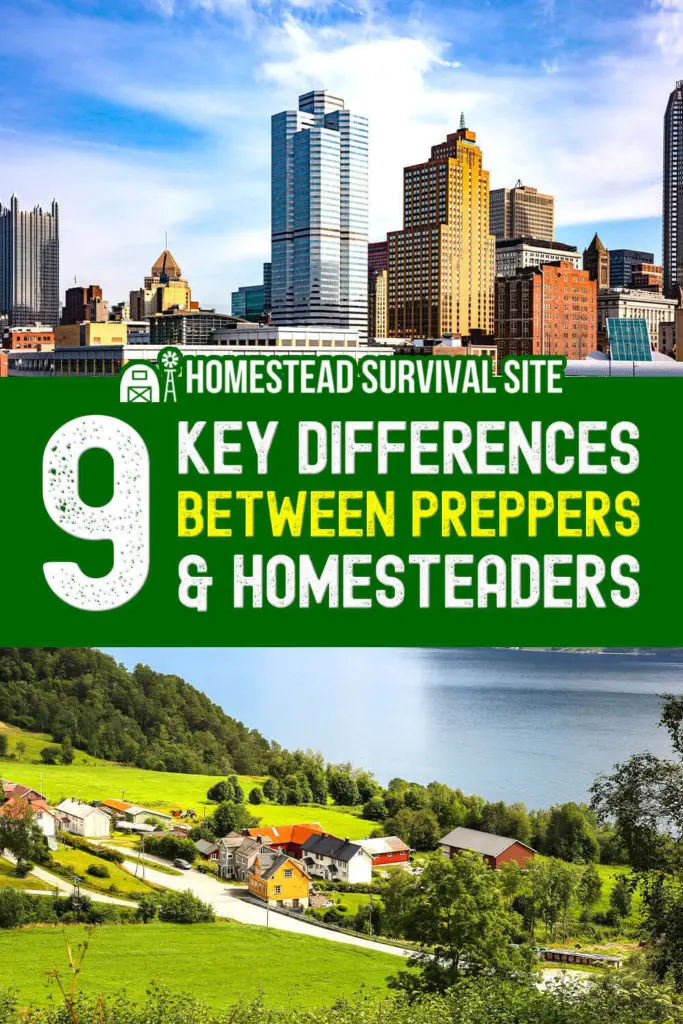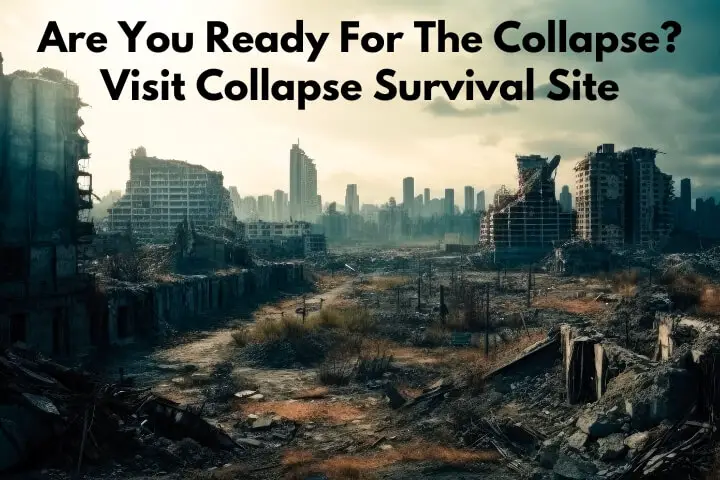Estimated reading time: 5 minutes
Are you a homesteader or a prepper? Both lifestyles are linked by their focus on self-sufficiency, but there are some key differences when it comes to motivation, food storage, water storage, shelter, skills, off-the-grid living, security, medical needs, and lifestyle. Let’s examine them so that you can see where you fit into the spectrum.
1. Motivation
One way to view the differences between homesteaders and preppers is through motivation. What caused you to pursue a more self-sufficient lifestyle?
For many preppers, it is the fear of a cataclysmic event – either caused by man or by nature – that could put them and their families in a life-threatening situation. Preppers plan ahead for the breakdown of traditional services that provide food, water, shelter, electrical power and security. Preppers hope to be self-reliant in the event of a short-term or prolonged emergency situation.
Although homesteaders may store food and supplies in a similar way as many preppers, they are motivated by the desire to live a more traditional, self-sustainable lifestyle. Homesteaders hope to be self-sufficient on an ongoing basis.
Want to save this post for later? Click Here to Pin It On Pinterest!
2. Food storage
Another way to compare and contrast homesteaders with preppers is with food storage. While both groups store food, they go about it differently.
Someone with a pure prepping mentality focuses on maintaining a certain amount of inventory and on how long that inventory will keep the family healthy. Some preppers have enough food and water stockpiled for 30 days, while others have enough to last for more than a year. Preppers often purchase these food supplies in bulk quantities from online or brick and mortar retailers.
Since homesteaders are seeking sustainability on a long-term basis, they grow or raise much or all of their food. Therefore, they store enough food to keep their families fed from harvest to harvest and to hold them over in the event of a poor or damaged harvest. Most homesteaders prefer to store their own foods rather than pre-packaged or commercially canned goods.
3. Water storage
Most pure preppers store water. They also focus on ways to filter and purify water in the event of a disaster. Some preppers have wells with manual pumps in place and/or water catchment systems.
Want to start a homestead but not sure how?
Click Here to get a FREE book, "How To Homestead No Matter Where You Live."
Homesteaders generally don’t store large supplies of water. Most try to have a well or a spring on their property, and most have a system for collecting rainwater for their gardens and their animals.
4. Shelter
Some pure preppers have a shelter located in the country that they can retreat to in times of emergency. Defensibility is considered in the construction and location of these structures. Although some preppers live at these shelters, they usually tend to be more like hunting cabins or weekend retreats rather than homes.
In contrast, homesteaders work the land they live on and do not have emergency retreats.
5. Skills
Both preppers and homesteaders focus on learning survival skills such as hunting and finding food and water in the wilderness.
Pure preppers learn these skills in order to survive during a time of disaster. Homesteaders, however, learn these traditional skills as a way to maintain their self-sufficient lifestyles.
6. Off the Grid living
Both preppers and homesteaders are intrigued with off-the-grid living. Not being dependent on public utilities is an advantage for both groups.
A difference is that preppers feel that being off the grid is important during a critical breakdown of communication that a disaster could bring, while homesteaders enjoy the savings and self-sufficiency that being off the grid brings.
7. Security
Both preppers and homesteaders may own guns; however, there are differences here, too.
Since preppers are aiming to be ready for a doomsday scenario, they may store large amounts of weapons and ammunition in an effort to protect themselves from looters and other criminals. However, homesteaders generally use their guns for hunting or for protection from unwanted animal intruders.
8. Medical needs
Since preppers are planning ahead for a huge event that could affect hospitals and medical services, they often purchase and store large amounts of first aid and medical supplies. They also learn about natural remedies for emergency situations.
Homesteaders also educate themselves on natural remedies and many grow medicinal herbs. Homesteaders do not stockpile medical supplies beyond what they would need for normal non-life-threatening situations, however.
Want to start a homestead but not sure how?
Click Here to get a FREE book, "How To Homestead No Matter Where You Live."
9. Lifestyle
People who are concerned solely with prepping aim to store enough food and supplies to last during a disaster, but otherwise they may lead “normal” 21st century lifestyles. In fact, you may not be able to distinguish a pure prepper from a non-prepper unless you see their long-term storage pantries.
Homesteaders, on the other hand, are seeking a more natural lifestyle. They may live in a small home on a small piece of land or they may live in a large home on a large piece of land, but they are learning to rely less on others and more on themselves.
Homesteading requires a frugal mindset that is quite different from the norm today. Homesteaders seek to grow their own produce and raise their own livestock. They learn to build and fix things themselves. They earn money for things they cannot make themselves by selling items they raise or make on their homestead.
Conclusion
It has been said that all homesteaders are preppers but that not all preppers are homesteaders. In fact, many homesteaders may start out as preppers, but, as they educate themselves on prepping, they begin to embrace a self-sufficient lifestyle.
The terms prepper and homesteader are often used interchangeably, but they do not mean the same thing. Are you a prepper or a homesteader? Perhaps you are a bit of both.
Like this post? Don't Forget to Pin It On Pinterest!



I respect the message here..even though I believe it is wrong on most counts.
My view is a tad different.
I have always considered myself a “prepper”.
In that the term simply means: a person who tries to be prepared.
If that means homesteading, so be it. If that means bugging out..well there ya go.
Homesteading during a drought would be a disaster, unless the homesteader was
prepared with a good store of water..for example.
In that case the homesteader was a successful prepper.
Collecting rain water and having a spring or a well is being prepared.
The authors view implies preppers are short sighted,
which is out of phase with the intent of prepping in the first place.
This is informative and interesting. But I also divide preppers into two categories disaster and preventive. The disaster ones are those you described. The preventive ones are those that prepare so something won’t occur. Examples of preventive prepping are: saving enough to tide you over in case of job loss so you won’t become homeless, going to school so you can get a job and not be unemployed, stocking up on candles so you won’t be in the dark if there is a power failure, growing a few salad veggies so you don’t have to eat the chemical laden ones in the supermarkets or learning to cook so the food won’t taste awful and save money,
People can identify with those things but not with doomsday scenarios. I never bring it up first but while talking something will come up and I ask them what they think can be done and what they have done in other areas of their lives. Sometimes I mention some simple thing I did and how it helped me.
Most people are preventive preppers in some way and once they realize it they do more prepping and some have gone on to homesteading in the city and in the country.
I see where a homesteaders is coo sidereal a lifestyle, but a prepper does most of the same things the homesteaders does in a smaller area many times (urban homesteading). Alot of these ‘differences’ i feel are by someone who is basing the idea of prepper based on so many stereotypes people have of them. We are prepared for job loss, inflation, shortages, hurricanes, etc.
I guess I am a hybrid 🙂
Excellent review of the differences between a prepper and a homesteader. A well thought out article. On point. I do not consider myself a prepper at all despite what others may think.
My husband and I bought and live on a working farm. We are learning many skills and do not for the most part buy meats packaged in plastic wrap. We raise our own. We do not yet grow ALL our food but that is in the works also. We only use wood heat from our woods. We have an Artisian well. Because we are older, we raise smaller animals we can physically handle. We do not use tractors and we plant by hand. We do have a tiller and that is changing…
As for medicine, we are self-sufficient and make our own from our land. It has been a joy and a privilege to live this life. Not an easy life but definitely satisfying and rewarding.